The Role and Importance of Sexual Orientation and Gender Identity in Heterosexual and LGBTQ Americans’ Lives
Introduction
In 2021, PRRI asked a series of questions related to how important personal identities are to Americans, one of which was about sexual orientation and gender identity: “When you think about your personal identity, how important is sexual orientation or gender identity in your life?” Respondents could say it is the most important thing, very important, somewhat important, not too important, or not at all important.
One-third of Americans (33%) said that their sexual orientation or gender identity is the most important thing or a very important thing in their lives. Just over four in ten LGBTQ Americans (41%) say their sexual orientation is the most important or a very important part of their identity, compared to one-third (32%) of heterosexual Americans. LGBTQ Americans comprise nine percent of the survey respondents, and 91% are cisgender (not transgender) and heterosexual.[1] It is not surprising that LGBTQ Americans say their sexual orientation or gender identity is the most important or a very important identity given the marginalization of the group and the celebration of Pride Month in June to commemorate the fight for LGBTQ rights and recognition. The concept of a strong cisgender heterosexual identity, however, might be somewhat surprising.
This report examines both LGBTQ and cisgender heterosexual Americans who say their sexual orientation is a very important identity and how the strength of their sexual orientation identity impacts their views.[2] The differences demonstrate quite clearly that heterosexual Americans who say their sexual orientation is a very important identity exhibit cultural and social threat attitudes, whereas LGBTQ Americans with a strong attachment to their sexual orientation are generally more progressive.
Profile of Americans Who Say Their Sexual Orientation Is a Very Important Identity
Demographics
The demographics of those who say their cisgender heterosexual identity is very important indicate they are a socially conservative group. These Americans are more likely to be over age 65, Republican, white evangelical Protestant or Black Protestant, Black, and living in the South than the general population. By contrast, those who identify as LGBTQ and say that their identity is very important or the most important thing are more likely to be young, single, lower income, Hispanic, religiously unaffiliated, Democrat, living in urban areas, and in the Northeast than the general population.[3] Both groups who report their sexual orientation is a very important identity are less likely to have a college education than the general population.
Age
Heterosexual Americans who say their sexual orientation is a very important identity are notably older than the general population: 30% are ages 65 and older, one in four are ages 50–64 (26%), about the same percentage are ages 30–49 (27%) and 18% are ages 18-29. By contrast, LGBTQ Americans who say their sexual orientation is a very important identity are notably younger than the general population: a plurality (44%) are ages 18–29, 30% are ages 30–49, 19% are ages 50–64, and six percent are ages 65 and older.
Party Affiliation
While heterosexual Americans who say their sexual orientation is a very important identity are more likely than the general population to be Republicans (36% vs. 27%), LGBTQ Americans who say their sexual orientation is a very important identity are more likely to be Democrats (61% vs. 34%). Heterosexuals who say their sexual orientation is a very important identity are equally as likely as the general population to be independents (27% vs. 29%), but LGBTQ independents who say their sexual orientation is a very important identity are less likely to be independents (18% vs. 29%).
Race/Ethnicity
Compared to all Americans, heterosexual Americans who say their sexual orientation is a very important identity are more likely to be Black (20% vs. 12%) and are less likely to be white than the general population (56% vs. 63%). Nearly two in ten are Hispanic (17%), six percent identify as another race, and only one percent identify as multiracial. By contrast, LGBTQ Americans who say their sexual orientation is a very important identity are more likely than all Americans to be Hispanic (33% vs. 16%) and are also less likely to be white (40% vs. 63%). About one in ten are African Americans (13%), and fewer identify with another race (9%) or are multiracial (5%).
Religious Affiliation
Heterosexual Americans who say their sexual orientation is a very important identity are about twice as likely as all Americans to be Black Protestants (15% vs. 7%), as well as more likely to be white evangelical Protestants (19% vs. 13%). LGBTQ Americans who say their sexual orientation is a very important identity are substantially more likely to be religiously unaffiliated (47% vs. 27%). Not surprisingly, only two percent of LGBTQ Americans identify as white evangelical Protestants and four percent as white mainline Protestants, compared to 13% and 14%, respectively, of all Americans.
Education and Income
Among those who say their heterosexuality is a very strong identity, 76% do not have college degrees, compared to 24% who have four-year college degrees or more. They are also more likely to make less than $50,000 per year compared to all Americans (34% vs. 30%). Similarly, LGBTQ Americans who say their sexual orientation is a very important identity are also less likely to make less than $50,000 per year compared to all Americans (39% vs. 30%).
Geography
With the exception of those who reside in the South (45% vs. 38%), there are no notable differences between heterosexual Americans who say their sexual orientation is a very important identity and all Americans by place of residence. By contrast, compared to all Americans, LGBTQ Americans who say their sexual orientation is a very important identity are more likely to live in urban areas (54% vs. 33%), less likely to live in rural areas (4% vs. 17%), and tend to reside more in the Northeast (23% vs. 17%) and less in the South (32% vs. 38%).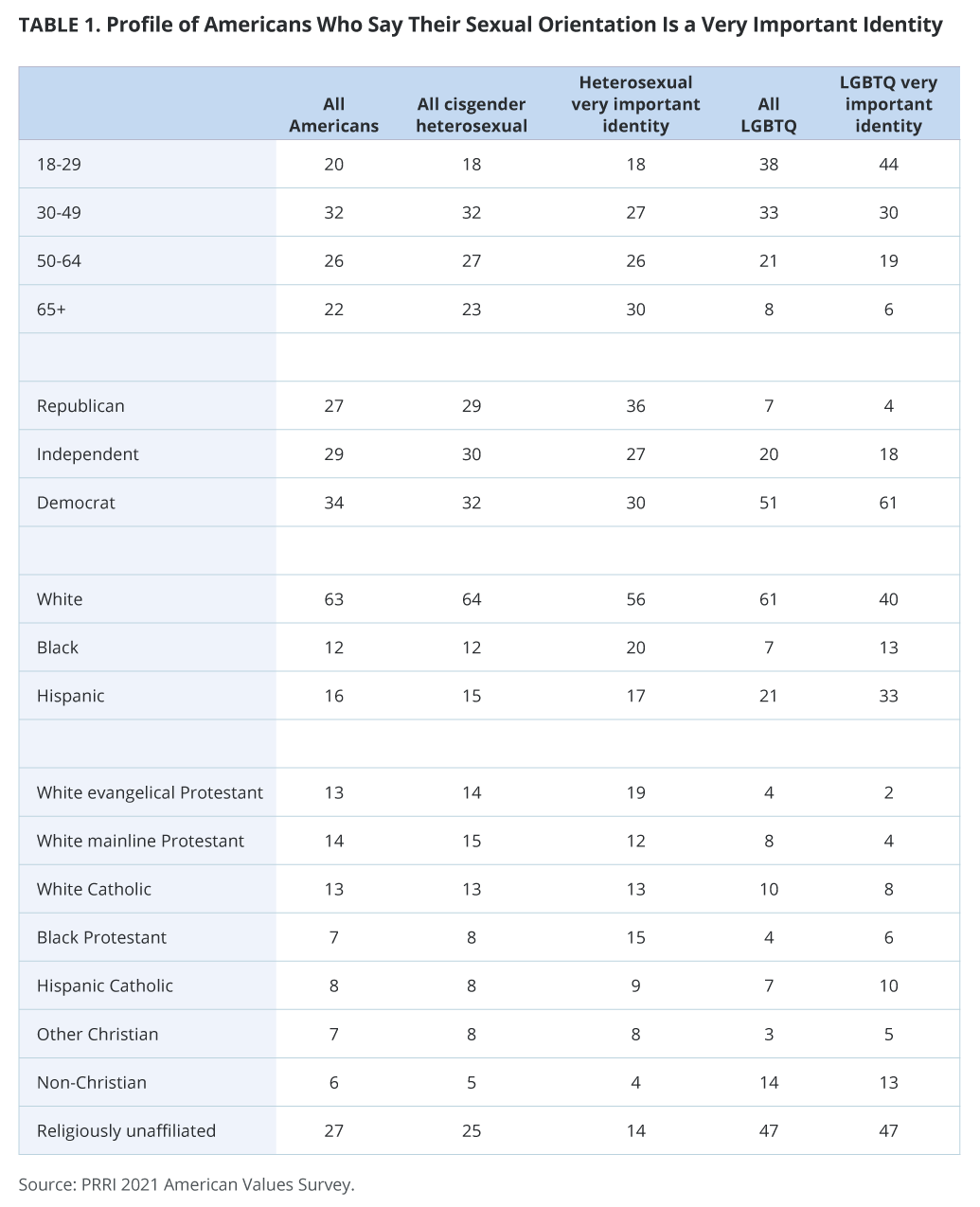
Explaining Who Views Their Sexual Orientation as Very Important
To further delve into which characteristics are most associated with having very strong attachments to sexual orientation, PRRI constructed a logistic regression model. The dependent variable is a recoded variable where those who indicated that their sexual orientation is the most important or a very important thing in their lives is coded as 1 and all other options are coded as 0.
The independent variables can be thought of in three categories: (1) religious variables, (2) political variables, and (3) socioeconomic and demographic variables.
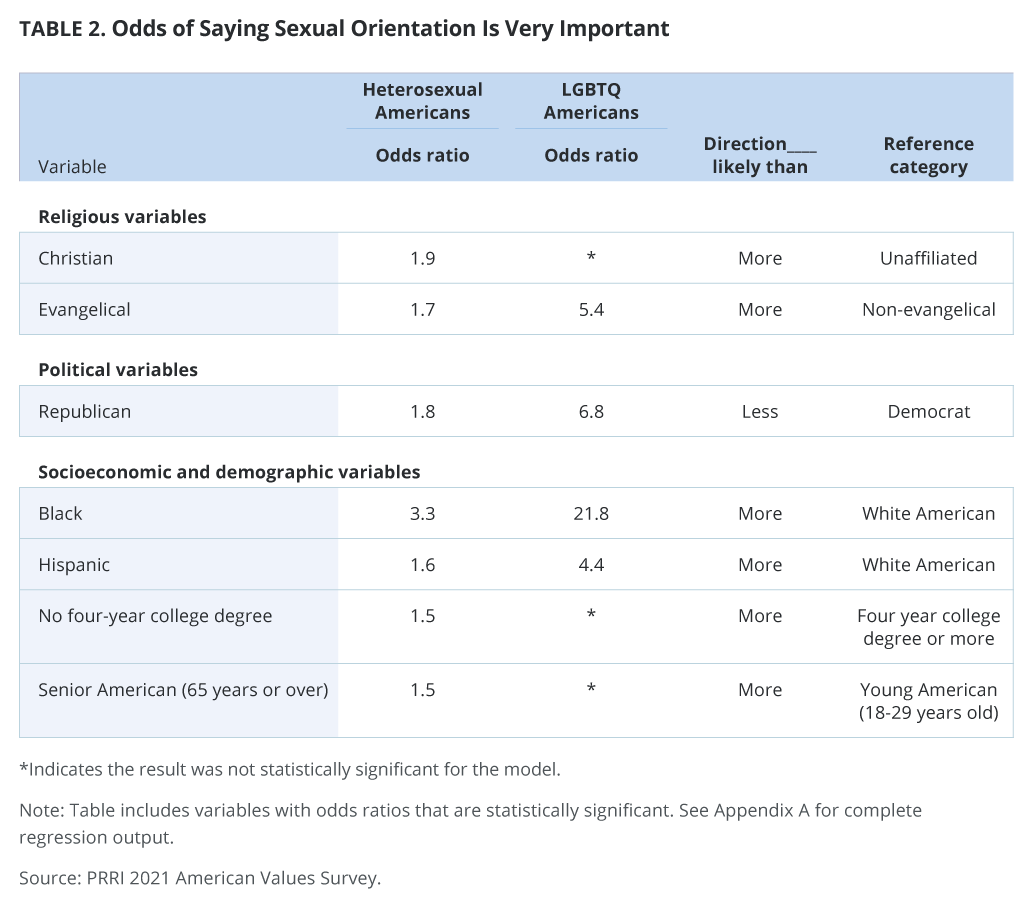 The most influential variables are those related to race. Both heterosexual and LGBTQ Black Americans are much more likely than heterosexual and LGBTQ white Americans to say their sexual orientation is a very important identity. Hispanic Americans are also more likely than white Americans to say their sexual orientation is a very important identity.
The most influential variables are those related to race. Both heterosexual and LGBTQ Black Americans are much more likely than heterosexual and LGBTQ white Americans to say their sexual orientation is a very important identity. Hispanic Americans are also more likely than white Americans to say their sexual orientation is a very important identity.
Heterosexual Republicans, Christians, and evangelicals are about twice as likely as heterosexual Democrats, the religiously unaffiliated, and non-evangelicals to say their sexual orientation is a very important identity. LGBTQ Democrats are notably more likely than LGBTQ Republicans to say their sexual orientation is a very important identity. Being Christian is not a significant predictor among LGBTQ Americans, but interestingly, LGBTQ Americans who identify as evangelical are more than five times more likely than those who are non-evangelical to say their sexual orientation is a very important identity.
Education and age are significant predictors for heterosexuals, but not for LGBTQ Americans. Heterosexual Americans without a college degree as well as heterosexual Americans 65 years and over are about twice as likely as those with college degrees and Americans ages 18–29 to say their sexual orientation is a very important identity.
Differences in How Those With Very Strong Sexual Orientation Identities View the U.S.
Views of America and Political Parties
When asked to choose which statement Americans agree with more, 45% agree more with the statement that the Republican Party is trying to protect the American way of life from outside threats, compared to 51% who agree more with the statement that the Republican Party has been taken over by racists. A majority of heterosexual Americans who say that their sexual orientation is a very important identity (57%) say that the Republican Party is working to protect the American way of life, compared to less than half of all heterosexual Americans (47%). LGBTQ Americans are more than three times as likely to agree with the second statement than the first statement (72% vs. 22%).[4]
A slim majority of all Americans (51%), half of heterosexual Americans (50%), and two-thirds of LGBTQ Americans (67%) are more likely to agree with the statement that the Democratic Party is trying to make capitalism work for average Americans. Comparatively, 44% of all Americans, 46% of heterosexual Americans, and 26% of LGBTQ Americans say that the Democratic Party has been taken over by socialists.
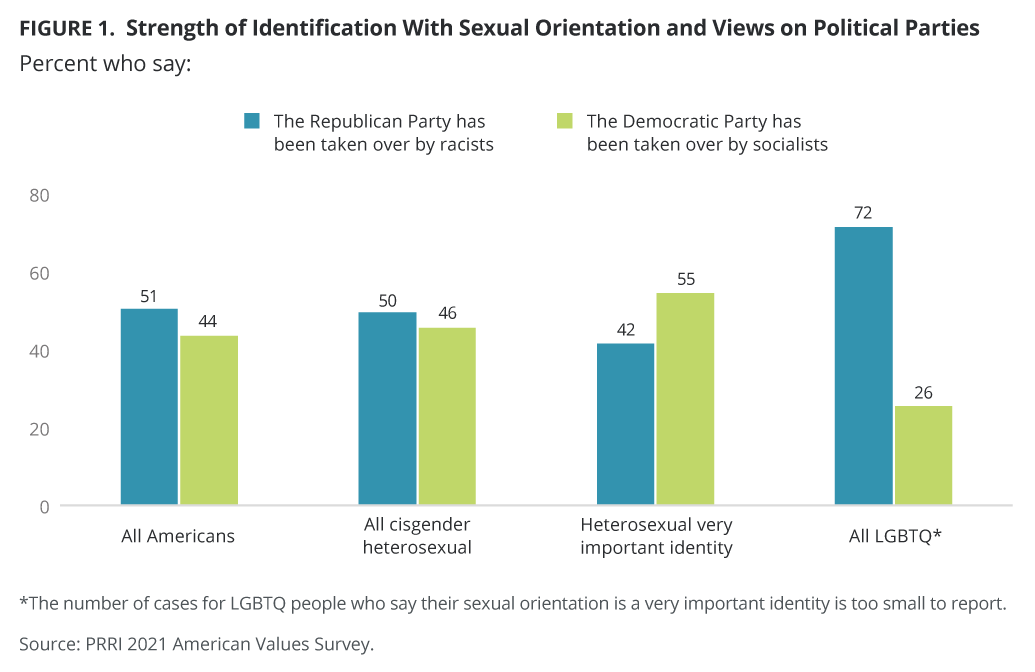
What Makes Someone ‘Truly American’
There are large differences between heterosexual Americans and LGBTQ Americans who say their sexual orientation is a very important identity on what makes someone “truly American.” Majorities of heterosexual Americans who say their sexual orientation is a very important identity say that the ability to speak English (89%), believing in God (81%), being Christian (68%), and being born in America (65%) are somewhat or very important to being truly American. Less than half of LGBTQ Americans who say their sexual orientation is a very important identity say the same (49%, 32%, 20%, and 25%, respectively). Moreover, heterosexual Americans who say their sexual orientation is a very important identity are nearly three times more likely than LGBTQ Americans who say their sexual orientation is a very important identity to say that being of Western European heritage is somewhat or very important to being truly American (29% vs. 11%).
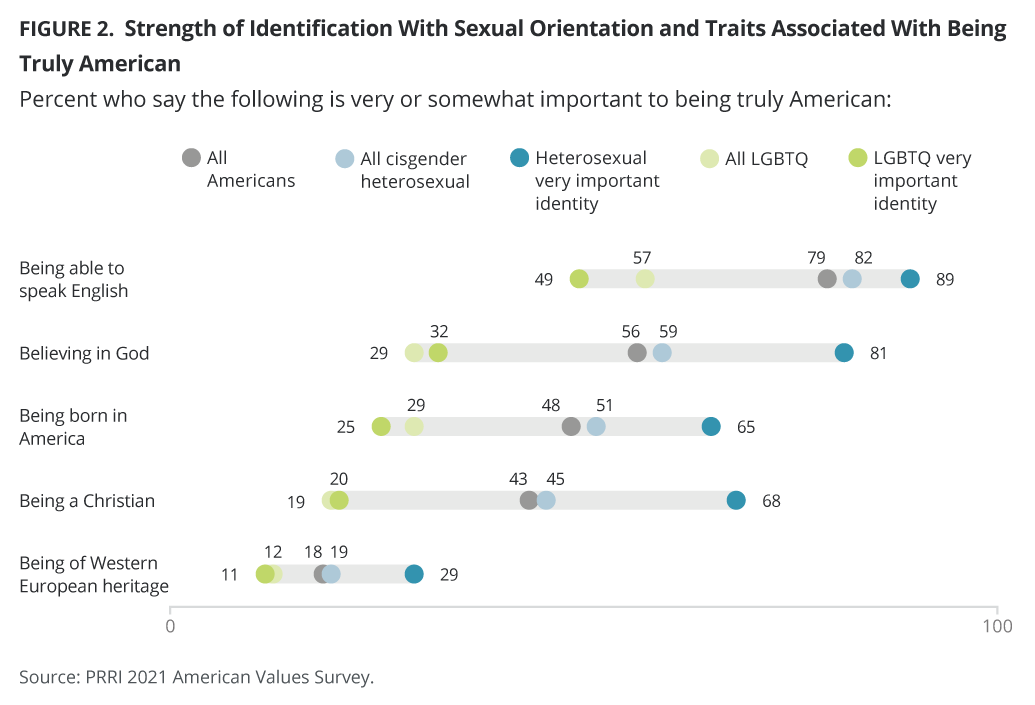
Views on Cultural Threats
While there are no notable differences between LGBTQ Americans who say their sexual orientation is a very important identity and all LGBTQ Americans in a variety of topics, they are generally less likely than heterosexual Americans to express feelings of cultural loss.
A majority of heterosexual Americans who say their sexual orientation is a very important identity (60%) agree that since the 1950s American culture and way of life have mostly changed for the worse, compared to 54% of all heterosexuals and 52% of all Americans. By contrast, LGBTQ Americans who say their sexual orientation is a very important identity (31%) and all LGBTQ Americans (34%) are much less likely to agree with this statement.
About two-thirds of heterosexual Americans who say their sexual orientation is a very important identity agree that “Today, America is in danger of losing its culture and identity” (68%), compared to smaller majorities of all heterosexuals (56%) and all Americans (53%). Partisans and white Christians who say their heterosexual orientation is a very important identity are notably more likely to agree with this statement than all partisans and all white Christians, but the biggest gap is among Democrats (52% vs. 33%) and white mainline Protestants (79% vs. 59%). Heterosexual Hispanics who say their sexual orientation is a very important identity are also more likely than all Hispanics to agree that “Today, America is in danger of losing its culture and identity” (56% vs. 42%).[5] LGBTQ Americans are notably less likely to agree with this statement (28%) than all other groups.
About half of heterosexual Americans who say their sexual orientation is a very important identity say that “things have changed so much that I often feel like a stranger in my own country” (49%), compared to four in ten among all heterosexuals (42%) and all Americans (41%). Democrats (41%) and white mainline Protestants (48%) who say their heterosexual orientation is a very important identity are more likely to agree with this idea than all Democrats and white mainline Protestants (32% and 37%, respectively), while LGBTQ Americans (33%) are notably less likely to do so than all these groups.[7]
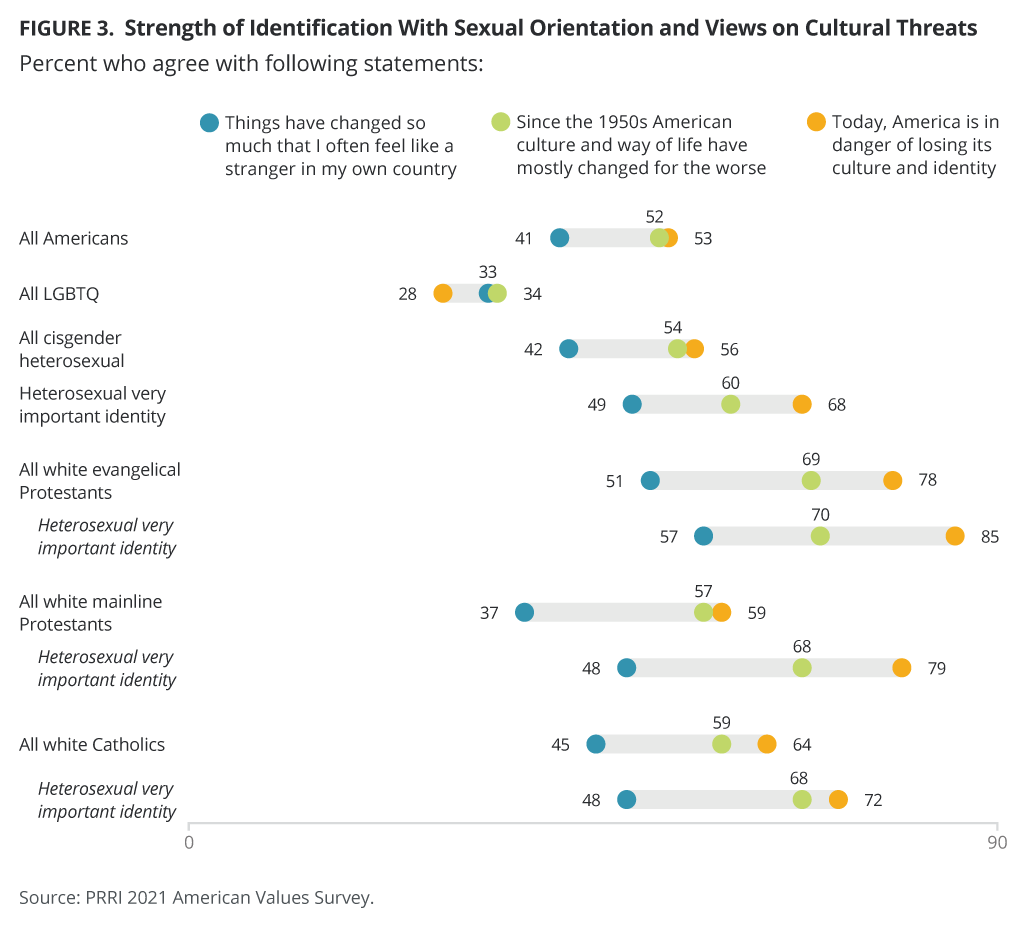
Preferences for Religious Diversity
Americans are divided on their preferences for religious diversity. When asked to put themselves on a scale where one end is the statement “I would prefer the U.S. to be made up of people belonging to a wide variety of religions” and the other end is the statement “I would prefer the U.S. to be a nation primarily made up of people who follow the Christian faith,” less than four in ten heterosexual Americans (37%) mostly agree with the religious diversity statement, and among those who consider their sexual orientation to be very important, only 24% indicate support for religious diversity. LGBTQ Americans are quite different—60% align themselves with a preference for religious diversity.[8]
The difference between heterosexuals who say their heterosexuality is a very important identity and all Americans is particularly pronounced among white Protestants—white evangelical Protestants (8% vs. 13%) and white mainline Protestants (19% vs. 33%).
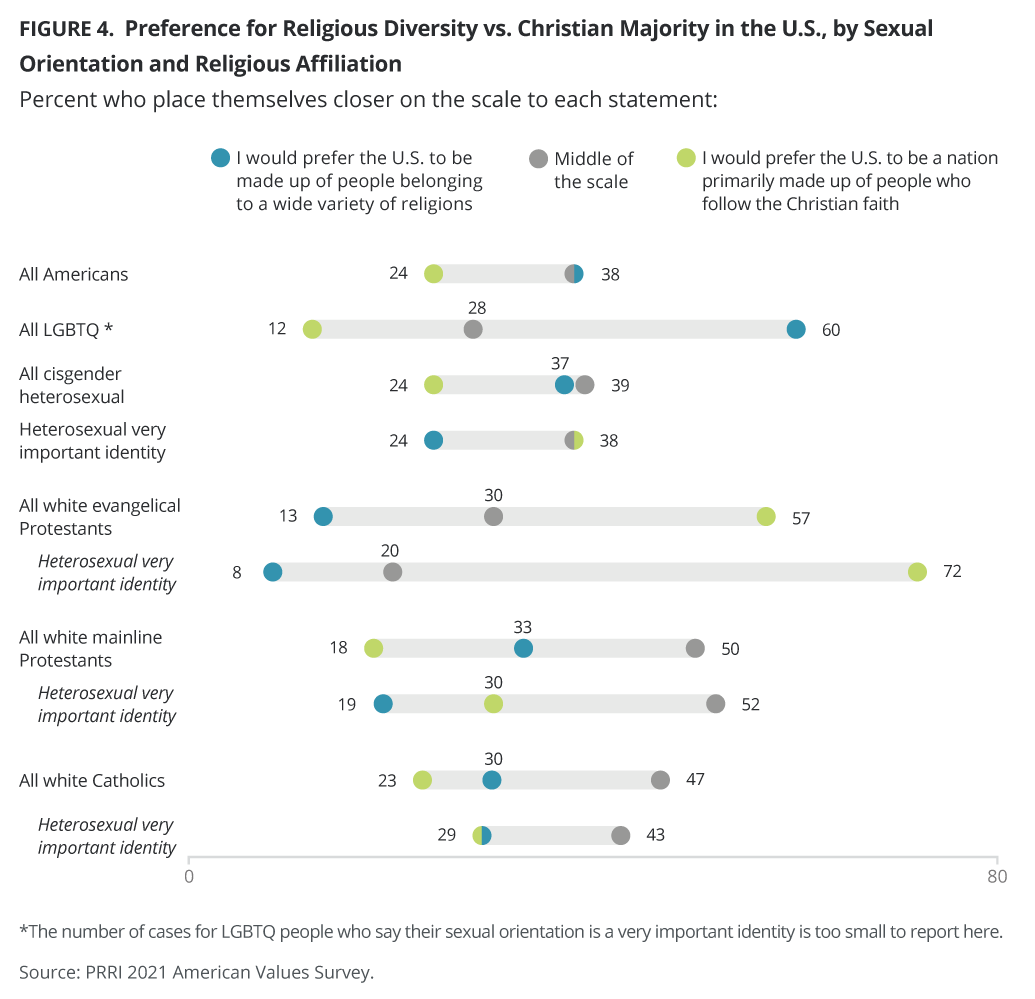
Views on LGBTQ Rights Issues
Heterosexual Americans who say their sexual orientation is a very important identity are less likely to support nondiscrimination protections for LGBTQ people or gay marriage and are less likely to oppose religiously based refusals than all heterosexuals, all Americans, and, not surprisingly, LGBTQ Americans.
About seven in ten heterosexuals who say their sexual orientation is a very important identity support laws that would protect gay, lesbian, bisexual, and transgender people against discrimination in jobs, public accommodations, and housing, compared to about three in four of all heterosexuals (69% vs. 76%). Similarly, less than half of heterosexuals who say their sexual orientation is a very important identity support allowing gay and lesbian couples to marry, compared to a majority of all heterosexuals (45% v. 63%). In addition, those who say their heterosexual identity is very important are less likely than all heterosexuals to oppose allowing a small business owner to refuse to provide products or services to gay or lesbian people, if doing so violates their religious beliefs (57% vs. 64%).
LGBTQ Americans and LGBTQ who say their sexual orientation is a very important identity are significantly more likely to hold these positions: support for nondiscrimination laws (90% and 92%, respectively), support for same-sex marriage (86% and 85%, respectively), and opposition to religiously based service refusals (79% and 83%, respectively).
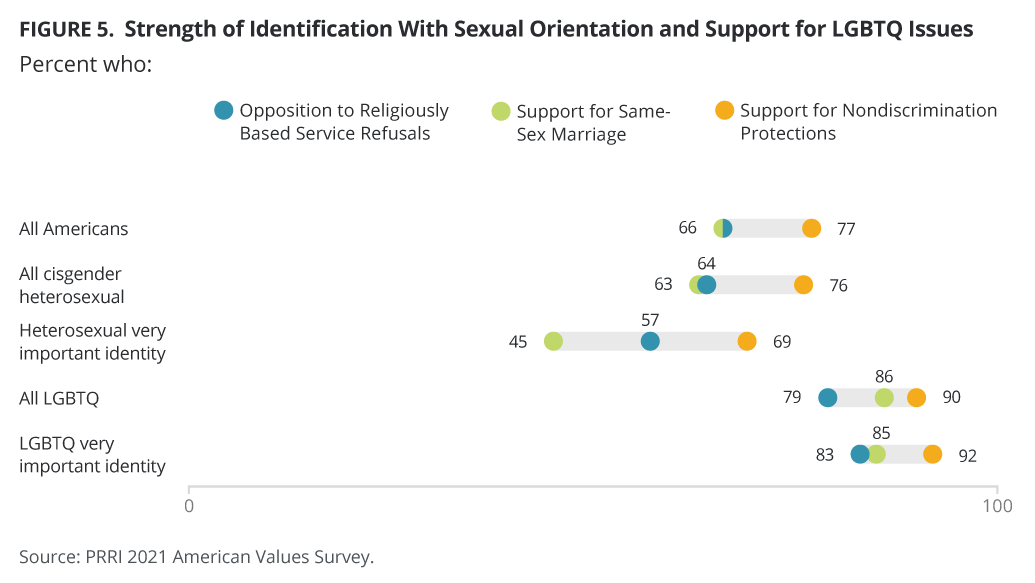
Composition of Social Networks of Heterosexual and LGBTQ Americans
Who people surround themselves with can shape their views, and a March 2022 PRRI survey provides information on the friendship networks of Americans, including the sexual orientation of those with whom they discuss important matters. Aside from a few demographics, most Americans of different types of groups say their friendship networks are primarily composed of heterosexual individuals and few LGBTQ people.
Sexual Orientation
Heterosexual Americans say that 93% of their friendship networks are composed of heterosexual individuals, with gay or lesbian and bisexual Americans composing one and two percent of the social networks, respectively. Around two-thirds of the social networks of bisexual Americans (68%) and 56% of the social networks of gay or lesbian Americans are composed of straight individuals. Both gay or lesbian and bisexual Americans are much more likely to have LGBTQ people in their social networks. Bisexual Americans say that around two out of ten individuals in their social networks are composed of gay or lesbian and bisexual people (seven percent and 12%, respectively). Gay or lesbian Americans say that gay or lesbian people make up 31% of their social networks and bisexuals make up seven percent.
Looking at the homogeneity of friendship networks, nearly three in four heterosexual Americans (73%) say that their friendship networks are composed of entirely heterosexual people, and only 18% say that their friendship network has a combination of both straight and LGBTQ individuals. The majority of both gay or lesbian and bisexual Americans (68% and 63%, respectively) say they have a combination of straight and LGBTQ people in their social networks.
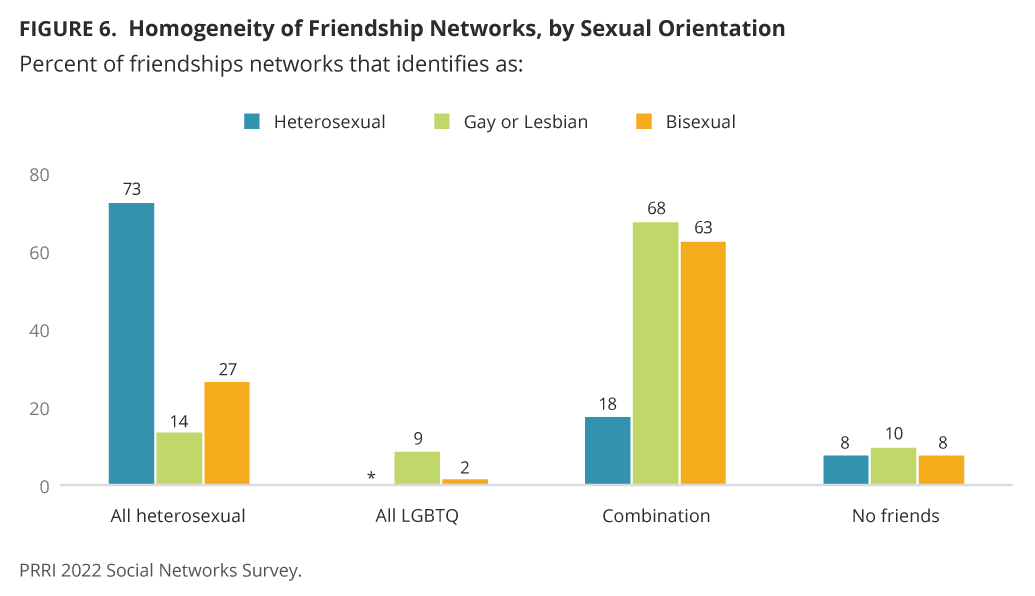
Political Affiliation
The vast majority of the friendship networks of Republicans, independents, and Democrats (95%, 89%, and 87%, respectively) are composed of heterosexual individuals. Republicans are more likely than independents and Democrats to say that their friendship networks are entirely composed of heterosexual people (79% vs. 68% and 62%, respectively). Likewise, Republicans are less likely to have a combination of straight and LGBTQ Americans in their friendship networks than independents and Democrats (13% vs. 22% and 29%, respectively).
Religious Affiliation Homogeneity
Eight out of ten white evangelical Protestants (80%) say that their friendship networks are composed of entirely heterosexual people, which is higher than white mainline Protestants (72%), white Catholics (72%), Hispanic Catholics (66%), and Black Protestants (65%). White evangelical Protestants are less likely than all these religious affiliations to have at least one LGBTQ person in their friendship network (14% vs. 26% of Black Protestants, 21% of white mainline Protestants, 21% of Hispanic Catholics, and 19% of white Catholics). Fifty-six percent of religiously unaffiliated Americans say that all of their friendship networks are heterosexual individuals and three out of ten (30%) say they have a combination of straight and LGBTQ people in their social networks.
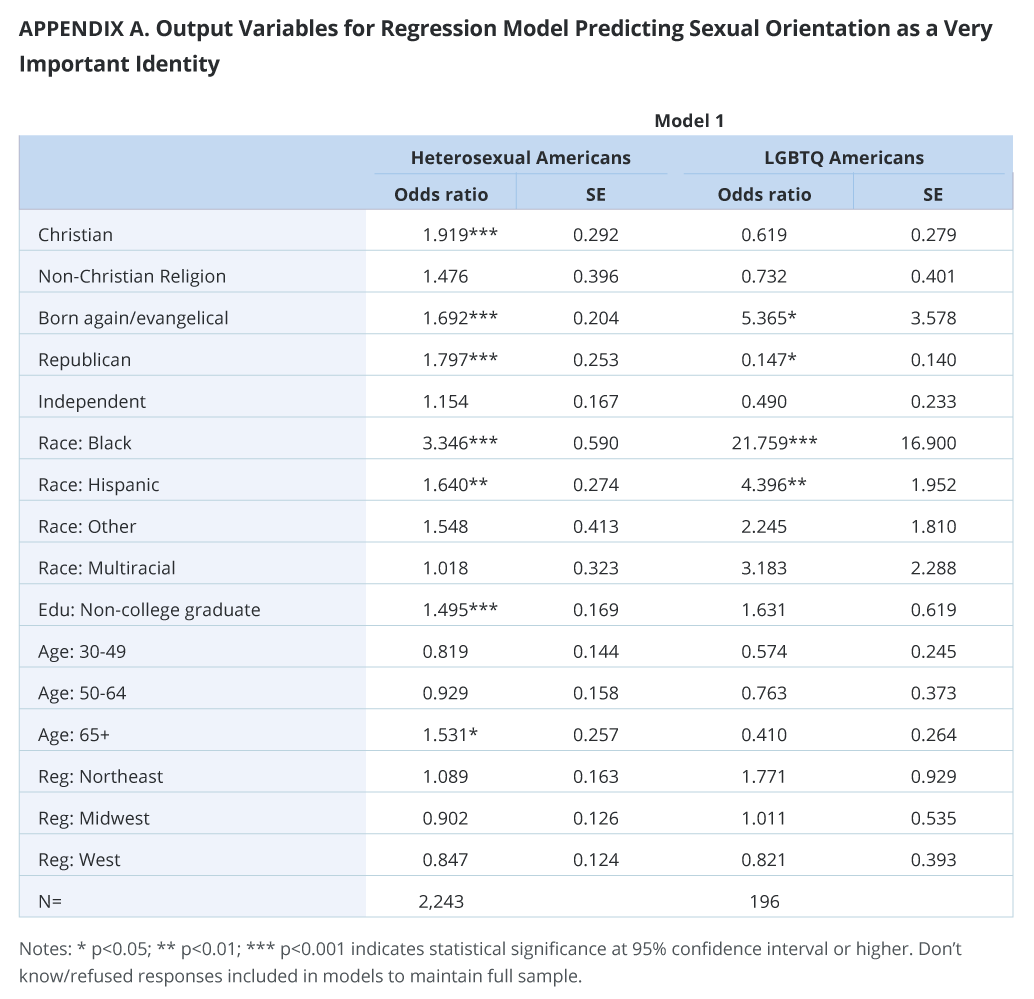
Survey Methodology
The survey was designed and conducted by PRRI. The survey was made possible through the generous support of the Carnegie Corporation of New York, with additional support from the Wilbur and Hilda Glenn Family Foundation and the Unitarian Universalist Veatch Program at Shelter Rock. Interviews were conducted among a representative sample of 2,508 adults (age 18 and up) living in all 50 states in the United States who are part of Ipsos’s Knowledge Panel. Interviews were conducted online between September 16 and 29, 2021.
Respondents are recruited to the KnowledgePanel using an addressed-based sampling methodology from the Delivery Sequence File of the USPS – a database with full coverage of all delivery addresses in the U.S. As such, it covers all households regardless of their phone status, providing a representative online sample. Unlike opt-in panels, households are not permitted to “self-select” into the panel; and are generally limited to how many surveys they can take within a given time period.
The initial sample drawn from the KnowledgePanel was adjusted using pre-stratification weights so that it approximates the adult U.S. population defined by the latest March supplement of the Current Population Survey. Next, a probability proportional to size (PPS) sampling scheme was used to select a representative sample.
To reduce the effects of any non-response bias, a post-stratification adjustment was applied based on demographic distributions from the most recent American Community Survey (ACS). The post-stratification weight rebalanced the sample based on the following benchmarks: age, race and ethnicity, gender, Census division, metro area, education, and income. The sample weighting was accomplished using an iterative proportional fitting (IFP) process that simultaneously balances the distributions of all variables. Weights were trimmed to prevent individual interviews from having too much influence on the final results. In addition to an overall national weight, separate weights were computed for each state to ensure that the demographic characteristics of the sample closely approximate the demographic characteristics of the target populations. The state-level post-stratification weights rebalanced the sample based on the following benchmarks: age, race and ethnicity, gender, education, and income.
The margin of error for the national survey is +/- 2.1 percentage points at the 95% level of confidence, including the design effect for the survey of 1.15. In addition to sampling error, surveys may also be subject to error or bias due to question wording, context, and order effects. Additional details about the KnowledgePanel can be found on the Ipsos website: https://www.ipsos.com/en-us/solution/knowledgepanel.
Endnotes
[1] To measure sexual orientation, the survey asks: Which of the following best describes how you think of yourself? (1) Gay or lesbian (2) Straight, that is, not gay (3) Bisexual (4) Something else. In addition, the survey measures gender identity as (1) Cisgender (2) Transgender (3) Other (4) Nonbinary. To compare attitudes of the LGBTQ American population with attitudes of the cisgender heterosexual population, the LGBTQ population is coded as 1, which combines transgender, other, and nonbinary with gay or lesbian, bisexual, and something else. The cisgender heterosexual population is coded as 0. “Heterosexual” is used throughout the report to describe the cisgender heterosexual category, and “LGBTQ” refers to lesbian, gay, bisexual, transgender, nonbinary, and the other/something else categories.
[2] Throughout this report, the answer options “the most important thing” and “very important” are combined to create the category of people who say their sexual orientation is a very important identity.
[3] The sample size for LGBTQ Americans who say their sexual orientation is very important or the most important thing in their life is n=75. This is a smaller subgroup than PRRI typically reports, but it is reported here in order to represent the views of this group and contrast with the heterosexual subsample. Differences reported are statistically significant even given this small sample size, but caution should be used in interpreting the exact size of those differences, as the margin of error for the LGBTQ sample is large.
[4] Because these questions were split-sampled, meaning they were only asked of half the sample, the subgroup of LGBTQ Americans who say their sexual orientation is a very important identity is too small to report.
[5] The results are statistically significant even though the number of cases for heterosexual Hispanics who say their sexual orientation is a very important identity is n=86.
[6] Because this question was split-sampled, meaning it was only asked of half the sample, the subgroup of LGBTQ Americans who say their sexual orientation is a very important identity is too small to report.
[7] Ibid.
[8] Respondents were asked to put themselves on a ten-point scale, where values of 1, 2, and 3 were coded as mostly agreeing with the statement “I would prefer the U.S. to be made up of people belonging to a wide variety of religions.” Values of 8, 9, and 10 were coded as mostly agreeing with the statement “I would prefer the U.S. to be a nation primarily made up of people who follow the Christian faith.” Values of 4, 5, 6, and 7 were grouped together as the middle.




